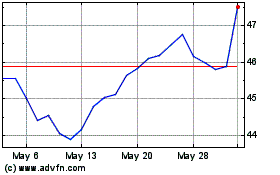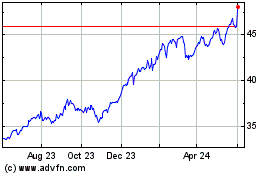India ETF in Focus on Recent Rate Hike - ETF News And Commentary
February 02 2014 - 11:47AM
Zacks
India, it seems, is destined for stubborn inflation and repo rate
hike. On January 28, the Reserve Bank of India (RBI) unexpectedly
hiked its repo rate by 25 bps to 8% in a bid to contain inflation.
With the latest hike, India raised its repo rates by the same
amount three times in the past five months (read: India ETFs After
the Surprise Rate Hike).
The Indian economy has been a victim of slowing economic growth,
persistent sky-high inflation, huge current account deficit, lower
per-capita income and massive corruption. After a roller-coaster
ride in much of 2013 on the Fed’s taper concerns and falling
currency (down about 14% in 2013), concerns over the Indian market
have been mounting since the beginning of this year thanks to the
Fed’s decision to start scaling back its QE program.
Investors should note that India’s inflation rate at more-or-less
10% is presently one of the highest in Asia. With a possibility of
continued QE trimming and flight of foreign investments from the
nation, Indian currency – rupee – is likely to weaken further in
the coming days and stir up another round of inflationary pressure.
While a slowing in December inflation has already been recognized,
rising pressure in service sectors and wage-led stress on inflation
were responsible for the RBI’s anxiety.
This apprehension might have prompted RBI to go for another rate
hike since its goal – and the principal agenda in its to-do list–is
to pull down inflation to 6% by 2016.
Further Tightening Ahead?
Economists expect the RBI to clamp down on liquidity in the coming
months as reduction of 4% inflation within two years apparently
seems a tall order for India. Some economists anticipate yet
another 25 bps hike in rate in early summer. However, the RBI
commented that there will be no further tightening in the near term
if consumer-price inflation slackens from the high of 10% to 8% by
early 2015.
However, many economists seem content with the latest RBI move
which is aimed at shoring up the Indian economy over the long term
and serves in ruling out inflationary threats and currency
depreciation. Still, there are economists with the opposite
view as well. As per the CII, the RBI needs to focus on boosting
investments and economic growth instead of curbing inflation (see
Is the Worst Over for These Emerging Market ETFs?).
Concerns
Yes, this step surely comes at the cost of growth (via higher cost
of borrowings) and probably corporate defaults. As per India
Ratings, the number of stressed companies will increase to 10.7%
from the current 9.5% if this latest rate hike results into higher
lending rates.
In fact, the situation may worsen if the RBI goes for further hikes
this year by taking the number of stressed corporates to 13.1% and
the amount of stressed debt to 16.5%. With the World Bank expecting
Indian growth rate below 5% – a 10-year low – for the financial
year 2013–2014, the recent hike is upsetting.
Market and ETF Impact
As one can imagine, this rate hike should give a much-needed boost
to the Indian rupee, helping to stop its fall. With India having a
huge oil import bill, a rate hike should be beneficial on this
front. However, the move definitely caused a slump in the Indian
equities on fears of slowing growth that resulted in losses in most
of the Indian ETFs.
WisdomTree India Earnings Fund
(
EPI) lost 1.61% at the close on January 29,
iShares MSCI India (INDA) shed 1.91%,
iShares India 50 ETF (INDY) slumped 2.25%,
PowerShares India (PIN) dropped 2.20%,
EGShares India Infrastructure ETF
(INXX
) fell 1.41% and
EGShares
India Consumer ETF (INCO) was down 2.72%. Notably, EPI is
by far the largest ETF in terms of asset base and also the most
liquid fund tracking Indian equities (read: Two India ETFs Leading
Emerging Markets Higher).
Rate Hike a Key Tool to Support Currency
India is not the only country taking the rate hike route; the move
has also been taken by a number of other emerging market central
banks in recent times to support their struggling currencies
against the dollar. Turkey was among such nations (read: Indonesia
ETFs Surge on Surprise Rate Hike).
Alongside with India, Turkey also raised its overnight lending rate
sharply on January 28 from 7.75% to 12%, one week repo-rate from
4.5% to 10% and overnight borrowing rate from 3.5% to 8%. Soon
after the announcement, Turkish currency lira went rallying and
gained as much as 3%.
Bottom Line
While a rate hike might help in boosting foreign investors’
confidence in the emerging markets, especially in the current
environment when currency devaluation is a large factor, the growth
picture becomes feeble. Also, investors should note that food and
fuel inflation has a high allocation in the Indian CPI.
Thus it is a bit doubtful as to how far this rate hike will help in
bringing down the overall inflation as the rate hike will largely
and directly bother industrial sectors and indirectly impact
sectors like food. A rate hike might come as a blow to the Indian
manufacturing sector at a time when the sector is struggling with
lower output.
Having said this, we would also like to remind investors that even
after a round of rate hikes, India’s real interest rate still
remains low. Also, the GDP growth outlook remains brighter than
many fast-growing developed markets. Thus, India ETFs could be
worth a closer look by risk-tolerant emerging market ETF investors
at this time.
Want the latest recommendations from Zacks Investment Research?
Today, you can download
7 Best Stocks for the Next 30
Days. Click to get this free report >>
WISDMTR-IN EARN (EPI): ETF Research Reports
EGS-INDIA CNSMR (INCO): ETF Research Reports
ISHARS-M INDIA (INDA): ETF Research Reports
ISHARS-SP INDIA (INDY): ETF Research Reports
EMERG-GS IIIIF (INXX): ETF Research Reports
PWRSH-INDIA POR (PIN): ETF Research Reports
To read this article on Zacks.com click here.
Zacks Investment Research
Want the latest recommendations from Zacks Investment Research?
Today, you can download 7 Best Stocks for the Next 30 Days. Click
to get this free report
WisdomTree India Earnings (AMEX:EPI)
Historical Stock Chart
From Dec 2024 to Jan 2025

WisdomTree India Earnings (AMEX:EPI)
Historical Stock Chart
From Jan 2024 to Jan 2025
